As a person of Caribbean heritage that grew up playing hockey, I have witnessed first-hand the insensitive remarks, behaviour and attitude that exists within certain hockey circles. Earlier this week, TSN produced a roundtable discussion with players regarding racism. The Iowa Wild’s J.T Brown, the Minnesota Wild’s Matt Dumba, the Winnipeg Jets’ Blake Wheeler and the Lehigh Valley Phantoms’ Kurtis Gabriel made up the panel.
I am not a professional hockey player. My experiences may not carry the same weight as those who sat down for the 30-minute conversation, sharing stories from both their youth and professional careers. However, just listening to these four players, it was scary how similar Dumba’s and Brown’s experience resembled my own.
When you’re of a younger age and being introduced to hockey for the first time, scouting the locker room for people who look like you isn’t at the front of your mind. Nevertheless, I knew before even hitting the ice for the first time, I was one of only two players who were racial minorities on the team.
Dumba recalled a time he was subjected of racial abuse while playing youth hockey. It hurt him and infuriated his mother. But his own team rallied around him. They took a stand and left the ice, conceding the game. However, they showed unity for their teammate, standing with him and letting him know he wasn’t alone.
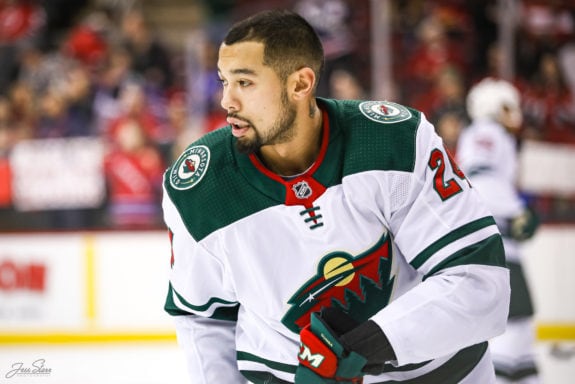
It’s important to voice these stories because it shows that hockey and hockey players cannot be judged as a whole simply because of the sport’s demographic. There are many good-hearted, decent players and teams who are as disgusted with racism as can possibly be.
Related: The NHL’s Evolution of Integration
However, unfortunately there are many cases when you run into the opposite. Players, fans and even teammates who think it’s okay, acceptable or who are just plain comfortable uttering offensive racial remarks.
Dumba had his teammates for support when he was subjected to abuse that no one should experience. However, that camaraderie was something that I didn’t always have. I remember sitting in the locker room on numerous occasions and hearing other players hurling the N-word around with blatant disregard for who was around.
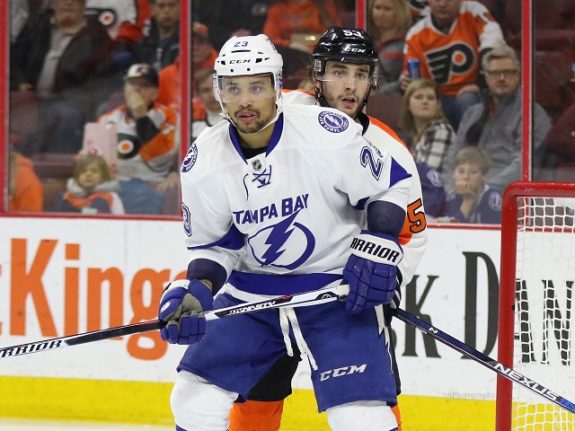
Often the word was said with such comfort you could only wonder whether they were saying it to offend, because they thought it was humorous like a child using a curse word, or whether it was so ingrained in their home life that they really saw nothing wrong with this ugly, heavily loaded word.
I couldn’t psychoanalyze the players who used the word on a regular basis. But I sometimes questioned, if this is how they spoke when I was in the room, how did they speak when I or other black players were not?
From the Locker Room to the Ice
Hockey players and hockey fans know that this game and “chirping” go hand in hand. In some instances, it can be witty and funny. However, the trash talk must be in good taste, it sometimes walks the line, but along with a list of other words and subjects, using racial slurs has no place in the game.
When I was on the ice, the same language that could be heard in the locker room was at times used by the opposition. This time the word wasn’t just thrown around, but rather it was directed towards me.
Often this behavior surfaced when my team was winning, or I was personally having a good game. It was often the success on the ice that I leaned on to rise above the negativity. We’ve heard several players who have been a target of racism in hockey to try and ignore the outdated attitudes, to solely focus on hockey and not let it affect them. It upsets me that I too ignored such remarks like many others because this is a topic cannot be ignored, regardless of race.
These were not isolated incidents. Racial abuse was seen time and time again from opposing players and parents and fans in the stands. Like I said earlier, it’s important to remember that not every hockey player is guilty of such behavior. This bigoted, narrow-minded, insensitive attitude may not be seen in every rink. It could be argued that this is the result of a few bad apples, but it can be said that one bad apple can spoil the bunch.
Racism on the Biggest Stage
Such behavior can leave a stain on the sport for some fans and players. As a young player, these events would force me to question at times whether this sport is for me? Is this a sport for us? Fortunately, my passion for the sport was unhindered. Fortunately for fans, the passion from Dumba, Brown, Simmonds, P.K. Subban, Devante Smith-Pelly, Seth Jones and others on the list of black professional players was also unhindered and continues to shine through while at the NHL level.
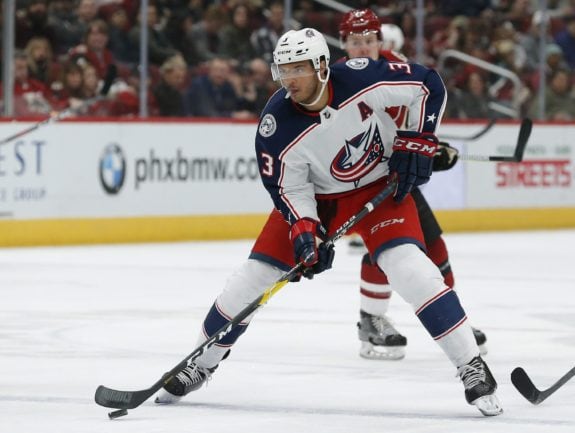
Joel Ward, a member of the Washington Capitals at the time, was the victim of racism when he scored the series-winning, overtime goal in Game 7 against the Boston Bruins in 2012. The Bruins released a statement shortly after the backlash, condemning the so-called fans who authored the tweets.
In 2011, while playing for the Philadelphia Flyers, Wayne Simmonds had a banana thrown at him while taking the first shot in the shootout. This exhibition game was not held in the United States, it took place in London, Ontario. So, this is not a problem confined to one country. It’s a problem that can be seen in several countries and at all skill levels.
Related: The 5 Greatest Hockey Players Ever
After the game, Simmonds was asked about the act and said, “When you’re black, you kind of expect (racist) things. You learn to deal with it.”
Yes, unfortunately when you’re black, you come to expect certain things, but we are at a point where we can no longer simply learn to deal with it. There is a conversation happening now and there are lessons to be leaned.
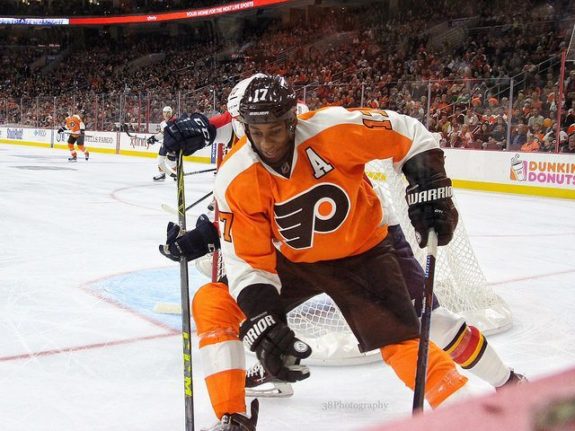
The NHL released a statement earlier this week that read: “As protests in both the United States and Canada in recent days have focused attention upon racial injustice for the Black community, the NHL stands with all those who are working to achieve a racially just society, and against all those who perpetuate and uphold racism, hatred, bigotry and violence.
“We share the sentiments expressed by our players and Clubs in their calls for justice, and we encourage everyone to use their platforms and privilege for systemic change. In our own sport, we will continue to do better and work diligently toward culture change throughout hockey and endeavour to be mindful of our own shortcomings in this process.”
A Time For Change
Racism and racial inequality is a problem that can be combatted. For all those who think that this is a problem that their voice can not solve, just know it can. It will not be easy, and the journey may be long, but educating each other will be key. When you see acts of injustice and narrow-minded thinking, say something. Turning a blind eye to such reprehensible behavior because it doesn’t directly affect you can be part of the “white privilege” that has been discussed so much recently.
Montreal Canadiens’ defenseman, Shea Weber said, “Growing up in a small town never afforded me the worldly experiences to understand racism or to ever really think about this issue as a young individual. My eyes have been opened to the realities that many people who don’t look like me on a daily basis. Racism is very real and must be called out.”
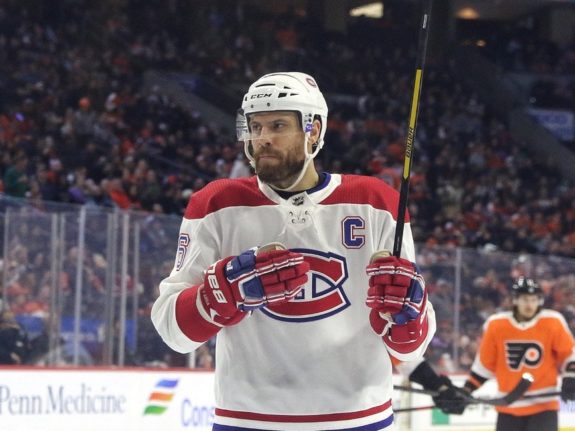
Some people may have been sheltered from the inequalities that run rampant in other cities and countries. You shouldn’t be judged by where you were born or where you grew up. However, with the current state of the world, everyone’s eyes should be open to the harsh reality that exists. It’s time to admit there is a problem, address personal shortcomings and have candid, difficult conversations. It’s the only way for meaningful, strategic action to take place and to build a foundation for change and a better future.